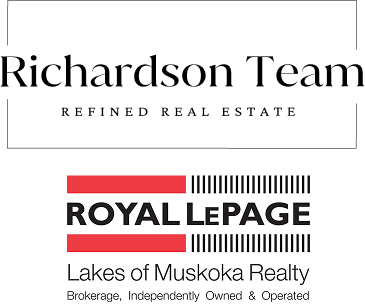Dock Politics and Neighbour Dynamics: The Unspoken Rules of Waterfront Living
Navigate the complex social ecosystem of waterfront communities and what can go wrong
The pristine waters of Lake of Bays shimmer in the morning sun as you sip your coffee on the deck, watching a great blue heron fish in the shallows. This is precisely why you invested in waterfront paradise—the tranquillity, the natural beauty, the escape from urban chaos. Yet lurking beneath this serene surface lies one of cottage country's most underestimated challenges: the intricate social dynamics that can make or break your waterfront experience.
In my years representing discerning clients across north Muskoka and Lake of Bays, I've witnessed how neighbour relationships can transform a dream property into a nightmare—or elevate a good cottage into an extraordinary lifestyle investment. The difference often comes down to understanding the unspoken rules that govern waterfront communities and recognising the warning signs before they become costly problems.
For established owners, the changing demographics of cottage country present new challenges to long-held community norms. Meanwhile, sophisticated buyers rightfully fear stepping into social landmines that could tarnish years of weekend retreats. Both concerns are entirely valid, and both require the insider knowledge that comes from decades of navigating Muskoka's unique waterfront culture.
The Invisible Boundary Lines: Understanding Waterfront Hierarchy
Every lake develops its own social ecosystem, as complex and nuanced as any urban neighbourhood. On Lake of Bays, Peninsula Lake, Fairy Lake, or any of our pristine north Muskoka waters, there exists an unspoken hierarchy that newcomers ignore at their peril.The established families—often second or third-generation cottage owners—form the informal governance structure of most lake communities. These are the folks who remember when the Smith family built their boathouse in 1987, who know exactly where the invisible line sits between the Anderson and Williams properties, and who can tell you which dock configuration will cause problems with winter ice flow.
This isn't snobbery; it's institutional knowledge that protects everyone's investment. When a new owner appears with plans that contradict decades of established practice, tensions inevitably arise. I've seen multi-million-dollar renovation projects grind to a halt because the owners failed to understand that their "perfectly legal" dock extension would block the neighbours' cherished sunrise view—a view that's been enjoyed unobstructed for thirty years.
The key insight? Legal rights and community harmony don't always align. Smart waterfront owners recognise that their property's long-term value depends as much on neighbourhood relationships as on square footage or shoreline frontage.
The Great Generational Divide: When Old Guard Meets New Money
Today's waterfront market reflects a fascinating cultural shift. Traditional cottage families who've summered in Muskoka for generations now sell to tech entrepreneurs, finance executives, and international buyers who bring different expectations and lifestyles to the lake.
The friction points are predictable yet profound. Established families treasure the quiet morning paddle, the evening loon calls, and the unspoken agreement that boat engines stay silent before 9 AM and after sunset. New owners, particularly those accustomed to urban convenience and luxury service, sometimes struggle with these invisible boundaries.
I recently mediated a situation where long-time Lake of Bays residents were horrified by their new neighbour's plan to install commercial-grade underwater lighting throughout their waterfront. Legally permissible? Absolutely. Consistent with four decades of community practice that prioritised natural darkness for wildlife and stargazing? Not remotely.
The resolution required delicate negotiation, compromise on the lighting design, and—crucially—education about why the community valued certain traditions. The new owners, once they understood the reasoning, became some of the lake's most conscientious stewards. But without proper guidance, this situation could have devolved into years of resentment and legal battles.
The Airbnb Avalanche: When Investment Properties Disrupt Community Fabric
Perhaps no trend has destabilised waterfront community dynamics quite like the explosion of short-term rentals. For established cottage communities built on relationships spanning generations, the constant rotation of strangers presents unprecedented challenges.
The problems are manifold and often catastrophic for property values. Weekend renters, unfamiliar with lake etiquette, blast music across the water at midnight. They leave garbage that attracts bears and coyotes. They operate boats recklessly, creating wake damage to neighbour's shorelines and docks. Most damaging of all, they transform the predictable, relationship-based community into something resembling a commercial resort.
I've watched property values on certain lake sections decline measurably when multiple cottages converted to Airbnb operations. The tipping point seems to occur when short-term rentals represent more than 20% of a bay's properties—at that threshold, the community fabric begins to fray.
For many sellers, the emergence of Airbnb properties presents a genuine threat to their investment's long-term appreciation. Sophisticated buyers rightfully consider the rental saturation of potential neighbourhoods before making offers. The presence of even one poorly managed short-term rental can eliminate the peaceful retreat atmosphere that justifies premium waterfront pricing.
The Thunder of Inconsiderate Engines: When Horsepower Overpowers Harmony
Muskoka's lakes have always celebrated boating culture, but the traditional respectful relationship between horsepower and environment faces new pressures. The emergence of powerful wake boats and aggressive watercraft operation has created unprecedented tensions in communities accustomed to considerate seamanship.The physics are unforgiving: a 500-horsepower wake boat travelling at speed near shore creates waves that damage docks, erode shorelines, and terrorise wildlife. Yet some owners seem oblivious to their impact, treating narrow bays like personal racetracks. The damage extends beyond the immediate wake—insurance claims for dock damage, expensive shoreline restoration, and the gradual degradation of the peaceful atmosphere that makes waterfront living special.
Smart lake communities develop informal protocols governing boat operation. These might include agreed-upon speed limits in narrow channels, no wake zones, designated areas for wakeboarding activities, and sunset quiet hours. When these norms break down—often due to new owners who don't understand, or respect established practices—the results can be financially and socially devastating.
The Dock Wars: Where Property Lines Meet Personal Pride
Dock disputes represent the most common—and often most bitter—conflicts in waterfront communities. The combination of unclear property boundaries, changing water levels, and evolving family needs creates a perfect storm for neighbourly discord.The typical scenario unfolds predictably: Family A decides to expand their dock to accommodate a larger boat. The extension, while technically within their property lines, blocks Family B's traditional boat path or interferes with their children's swimming area. What begins as a property rights issue quickly becomes personal, with decades of goodwill dissolving into legal threats and community division.
The emotional stakes are enormous because docks represent more than functionality—they're the stage for countless family memories. When the Johnson family's new floating dock system interferes with the Wilson family's traditional Canada Day gathering spot, the conflict transcends mere property disputes.
Prevention requires understanding both legal boundaries and community expectations. I always advise clients to consult neighbours before dock modifications, not just municipal authorities. The extra conversation can prevent years of animosity and protect everyone's property values.
The Social Minefield: What To Watch For
For prospective buyers certain warning signs should trigger immediate caution:Obvious Visual Cues: Multiple "No Trespassing" signs, poorly maintained common areas, or dramatically different property aesthetics suggest underlying tensions. When one cottage looks like a fortress while others remain open and welcoming, community dynamics have likely soured.
The Airbnb Test: Ask directly about short-term rentals in the area. A single poorly managed Airbnb can destroy the peaceful retreat atmosphere that justifies premium pricing. Look for evidence of transient occupancy—excessive guest parking, commercial-style signage, or properties that remain dark most weekends but busy during peak periods.
Dock Politics Detective Work: Observe dock configurations during your visit. Do they appear thoughtfully positioned to minimise conflicts, or do you see obvious encroachments and aggressive positioning? Are boats stored respectfully, or do you see evidence of inconsiderate operation—damaged shorelines, excessive wake patterns, or commercial-grade equipment inappropriate for intimate bay settings?
Community Engagement Indicators: The best waterfront communities demonstrate informal but effective self-governance. Look for evidence of shared maintenance on common areas, coordinated approaches to environmental stewardship, or simply the willingness of current owners to engage in friendly conversation about lake dynamics.
The Seller’s Dilemma: Protecting Legacy Value
For established owners contemplating selling, the changing nature of cottage country presents strategic challenges. Your property's premium value depends not just on its inherent qualities but on the character of the surrounding community.The key insight: your lake's social dynamics directly impact your property's marketability to discerning buyers. A bay known for respectful relationships and consistent property stewardship will always command premium pricing over areas plagued by conflicts or dominated by transient occupancy.
Solutions That Actually Work: The Art of Waterfront Diplomacy
Successful waterfront communities develop informal but effective governance systems that prevent most conflicts before they escalate. The key principles apply whether you're an established owner or prospective buyer:Relationship Investment: Treat neighbour relationships as seriously as property maintenance. Regular communication, early conflict resolution, and genuine respect for others' enjoyment prevent minor issues from becoming major problems.
Community Standards: Support the development of informal protocols that protect everyone's investment. These might include agreed-upon quiet hours, boat operation guidelines, or dock maintenance schedules. Written agreements aren't necessary—shared understanding and mutual respect suffice.
The Path Forward: Protecting Your Waterfront Investment
Waterfront properties represent more than real estate investments—they're lifestyle choices that depend entirely on community harmony for their long-term value. Whether you're an established owner or a prospective buyer, understanding dock politics and neighbour dynamics is essential for protecting your investment and ensuring decades of peaceful enjoyment.The unspoken rules of waterfront living exist for good reason. They've evolved over generations to protect both property values and the unique lifestyle that makes cottage country special. Respect them, contribute to them, and your waterfront investment will provide both financial returns and personal satisfaction for years to come.
At the Richardson Team, we understand these dynamics intimately because we live them daily. Our deep knowledge of north Muskoka and Lake of Bays communities allows us to guide both buyers and sellers through the complex social landscape that defines waterfront living.
Your waterfront dreams deserve both professional expertise and community wisdom. Choose both wisely, and the gentle lapping of waves against your dock will soundtrack decades of peaceful memories rather than neighbourhood discord.
Jay Richardson, Broker



